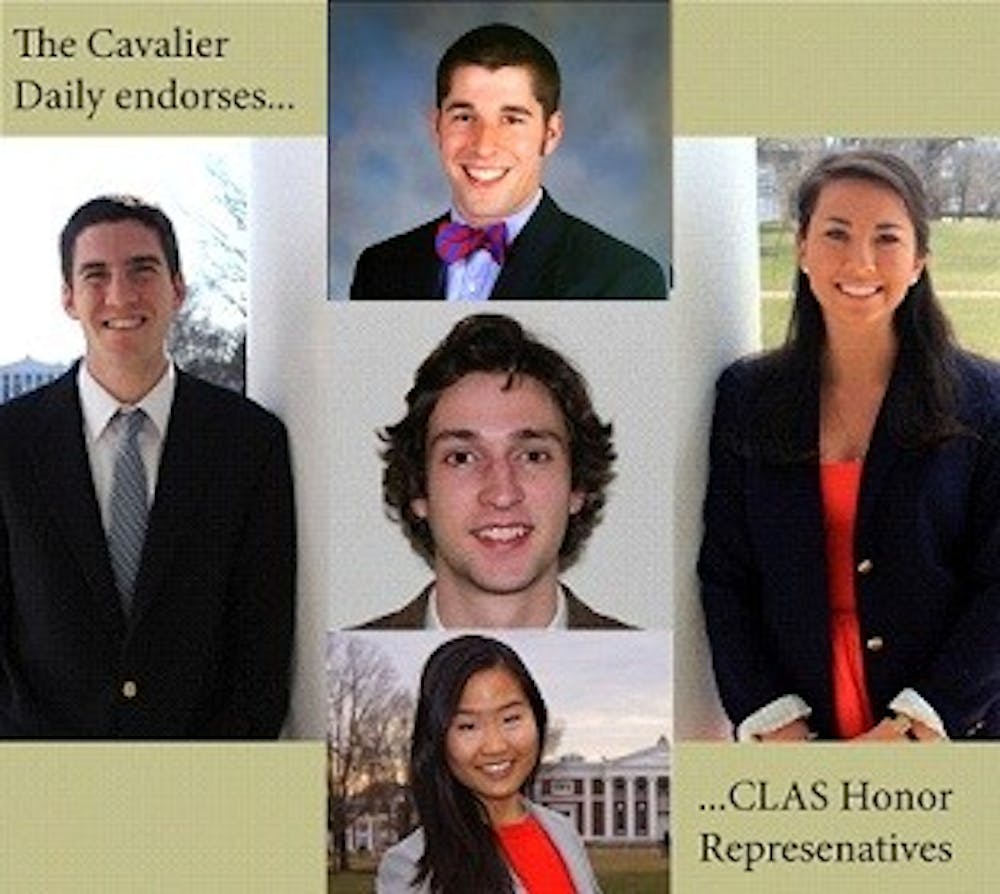On initial scrutiny, the students running to be Honor Committee representatives for the College seem much the same. We spoke to seven of the nine candidates: third-year Christopher Pena missed his interview for personal reasons, and third-year Blake Wheelock failed to sign up for an endorsement session altogether. The seven we interviewed were charming and, at first glance, indistinguishable. All were Committee insiders. All were polished and poised. All adhered to a party line, with little exception. Everyone affirmed their faith in the single sanction, and all candidates but one threw their weight behind the current proposed honor reforms, the Restore the Ideal Act.
All candidates exuded civility and restraint. While it was not uncommon to hear Student Council candidates bash Council’s workings, would-be Committee representatives deftly directed their criticisms toward a “broken system,” not the Committee itself — suggesting, as the recent proposal does, that honor’s failings have nothing to do with the persons who implement it.
There are several possible reasons for the homogeneity of the Committee’s candidate pool. The social demands of Committee proceedings might cultivate a certain type of leader — one sustained by the undeniable seriousness of the Committee’s work. Upholding a 171-year-old hallmark of University life is a grave responsibility: jollity and goofiness would fall flat in the Committee’s meeting room.
Cultivation aside, it is also possible the Committee attracts certain kinds of students. On a superficial level this is true: The Committee’s demographic makeup in recent years has not kept track with the University’s growing racial and ethnic diversity. A lack of targeted recruitment explains much of the organization’s demographic blandness. Several candidates described the Committee’s recruitment efforts as passive. Resting on reputation, the Committee receives a sufficient number of applicants without having to actively solicit them.
A third possibility: Candidates have not taken pains to distinguish themselves in the race because campaigning for the Restore the Ideal Act has preoccupied them.
We wish the pool of Committee representative candidates was more varied, both demographically and in terms of ideas. But the deadline to file for candidacy passed weeks ago — and though many of the contenders who jumped in the race hold identical views, all candidates we interviewed were competent and intelligent. Five candidates, all third years, particularly impressed us: Brittany Wengel, Conor O’Boyle, Josh Myers, Evan Behrle and Julie Yee.
The term “outreach” is vague and unhelpful. But Wengel, an educator for the Committee, provided tangible examples of how she would help increase students’ understanding of the honor system as a representative. Wengel suggested the creation of an honor newsletter and honor summits with student leaders. A coxswain for the women’s rowing team, Wengel provides the Committee with a crucial access point for a disproportionately reported group: student athletes.
O’Boyle — one of the Committee’s three senior counsel members, along with Behrle and fellow candidate Will Lovell — recognizes the need to increase the Committee’s level of accountability, both to the public and within the body. He plans to reinstate first-year honor dorm talks and proposed a whistle-blowing system within the Committee to mitigate for the lack of public transparency demanded by students’ privacy rights.
Myers, an educator, plans to improve the Committee’s recruitment process by making it more active. Behrle, a senior counsel member, correctly identified buy-in as one of the Committee’s main problems, and he suggested the establishment of weekly events, inspired by the roundtable discussions current Committee Chair Stephen Nash led in the fall, to give students a space to talk about honor. Both Myers and Behrle praised the single sanction for the high standard to which it holds the University community, but both also discussed the high human cost the single sanction imposes. If they are elected, we hope Myers and Behrle will continue to draw on these reserves of empathy in helping to implement a just system.
Yee is the only candidate who opposes the Restore the Ideal Act. Though she’ll be voting against the proposal next week because she believes the jury-reform component unduly limits the diversity of jury composition, Yee nonetheless deems some type of honor reform necessary. She suggested changes in jury education and jury screening, including sending out juror surveys to a larger group of students before each trial in an attempt to get more committed jury panels.
The role of Committee representative is an important one. And if the Restore the Ideal Act passes, these students, as jurors, will exercise not only influence but also great power. Wengel, O’Boyle, Myers, Behrle and Yee are the College’s best bet for a strong group of representatives.







